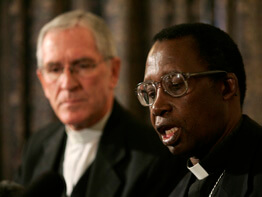VATICAN CITY – Pope Benedict XVI accepted the resignation of Zimbabwean Archbishop Pius Ncube of Bulawayo, the most outspoken critic of the country’s leadership who is also facing allegations of adultery.
In an undated letter written by the archbishop and released by the Vatican press office Sept. 11, the archbishop wrote that he offered his resignation to Vatican officials in July to spare sullying the image of the church.
The Vatican announced that the pope accepted the archbishop’s resignation under Canon 401.2, which covers resignations for illness or some other grave reason.
Archbishop Ncube, 60, is being sued for adultery and his case is before the High Court of Zimbabwe in Bulawayo. The adultery lawsuit was made public in July and state-run newspapers published photos they said were of Archbishop Ncube and a woman, taken with a concealed camera placed in the archbishop’s bedroom.
Archbishop Ncube’s resignation “is not to be seen as an admission of guilt” to the adultery charges and it “shouldn’t have any bearing on the court case,” Father Frederick Chiromba, secretary-general of the Zimbabwe Catholic Bishops’ Conference, said in a Sept. 11 telephone interview from the capital, Harare.
Father Chiromba said Archbishop Ncube’s resignation was “not expected,” but that he would “now have more time to attend to the charges” against him.
Noting that Archbishop Ncube “tendered his resignation and was not asked to resign,” Father Chiromba said the archbishop may have “wanted to stand aside so that the focus can shift” from himself to the political and economic crisis in Zimbabwe.
His resignation will have no major impact on the bishops’ conference as it “makes decisions and issues statements as a unit,” Father Chiromba said.
In the letter released by the Vatican, Archbishop Ncube wrote that he alerted the pope by letter “within days” of the news reports, calling it “obviously a state-driven, vicious attack not just on myself, but by proxy on the Catholic Church in Zimbabwe.”
He said he wished to resign as head of the Archdiocese of Bulawayo “to spare my fellow bishops and the body of the church any further attacks.”
In an Aug. 29 statement from Harare, Zimbabwe’s bishops had called attacks on Archbishop Ncube “outrageous and utterly deplorable” and an attempt to divert attention from the catastrophe that Zimbabwe has become.
The archbishop has long been an outspoken critic of the country’s leadership, especially Zimbabwean President Robert Mugabe. The church leader has urged Zimbabweans to take to the streets in protest against decades of government oppression.
Archbishop Ncube’s lawyer has said the allegations of adultery are part of a “well-orchestrated campaign” to discredit him.
Archbishop Ncube said in his letter that although he has stepped down as head of the archdiocese “I remain a Catholic bishop in Zimbabwe and will continue to speak out on the issues that sadly become more acute by the day,” such as the country’s grinding poverty and severe food shortages.
“I have not been silenced by the crude machinations of a wicked regime,” he wrote, adding that he will decide in the next few weeks where he will continue working – either in the church or with grass-roots groups – to advocate “for greater humanitarian support, in particular, for food and medical supplies,” and “to continue with God’s work.”
In neighboring South Africa, Bishop Kevin Dowling of Rustenburg expressed shock upon hearing the news.
“This will have huge repercussions in Zimbabwe, where he is seen as a prophetic voice,” Bishop Dowling said. “He has massive support in Matabeleland, where they see this as an attack on the Matabele people, not just on their leader.”
Matabeleland is a region in western Zimbabwe.
Bishop Dowling confirmed that the camera placed in the light in Archbishop Ncube’s bedroom was put there by Ernest Tekere, a senior intelligence operative for the Zimbabwean government for 20 years. Tekere allegedly was involved in the Gukurahundi campaign, in which government troops were responsible for the murders of about 20,000 people as well as torture and human rights abuses in the western Matabeleland province from 1981 to 1987.
As a result of the photos, Onesimus Sibanda claimed damages from Archbishop Ncube for an alleged affair with his wife, Rosemary Sibanda.
Zimbabwe is crippled by the highest rate of inflation in the world, unemployment of more than 80 percent, and shortages of foreign currency and fuel. Food shortages are acute, large numbers of people are migrating to the neighboring countries of South Africa and Botswana, and, with elections scheduled for March, political violence has intensified.
Contributing to this story was Bronwen Dachs in South Africa.


